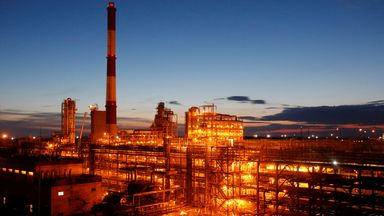Network Rail has announced plans to ramp up spending on protecting railways from climate change and extreme weather – with around £2.8bn set to be invested in the next five years.
The money will be spent on recruiting nearly 400 additional drainage engineers and training hundreds of operational staff to interpret weather forecasts better.
The government-owned company also plans to make railway embankments more resilient and install CCTV at sites with a high risk of flooding.
Collapsed embankments have caused major disruption on multiple routes in recent months.
The Chiltern Main Line near Bicester, Oxfordshire and the West Coast Main Line between Coventry and Rugby were both blocked by landslides in January and February, respectively.
Extreme weather events in the UK have become more common and England saw a record amount of rainfall in the 18 months up to March this year.
Network Rail chief executive Andrew Haines described climate change as "the biggest challenge our railway faces".
"The extreme weather of the past year... has taken its toll on our railway - with experts predicting more of the same to come," he said.
More from Sky News:
UK train strikes taking place in April and May
Passengers 'punished' by rail fare hike

"We are responding to that challenge with a huge investment in making our railway more resilient and better-performing for rail users during such events," Mr Haines continued.
"We can never completely weatherproof our railway, but we can be better prepared and mitigate the worst that Mother Nature throws at us - now and into the future - to keep passengers and services safe and moving."
The spending is part of Network Rail's £45.4bn five-year investment plan, which also includes a £19.3bn spend on replacing old assets with new ones and investing in projects such as digital signalling.
Some £12.6bn has been earmarked for maintenance, £5.3bn for support functions such as timetabling and IT, £4.4bn for operations including signalling and £1.8bn will be set aside in a risk fund for unforeseen events.
The majority of Network Rail's income will come from UK and Scottish government grants (£29.8bn). It also receives track access charges from train operators (£13.8bn) and looks set to make £1.7bn from commercial incomes, such as retail and property.
Rail minister Huw Merriman said: "Our railways are at the heart of many people's daily lives and getting us to where we need to be, whether that's to family and friends, work, education or holiday destinations.
"That's why the network must be fit for the future, with the resilience to handle extreme weather while offering the reliability and level of service our passengers deserve."
Disclaimer: The copyright of this article belongs to the original author. Reposting this article is solely for the purpose of information dissemination and does not constitute any investment advice. If there is any infringement, please contact us immediately. We will make corrections or deletions as necessary. Thank you.



